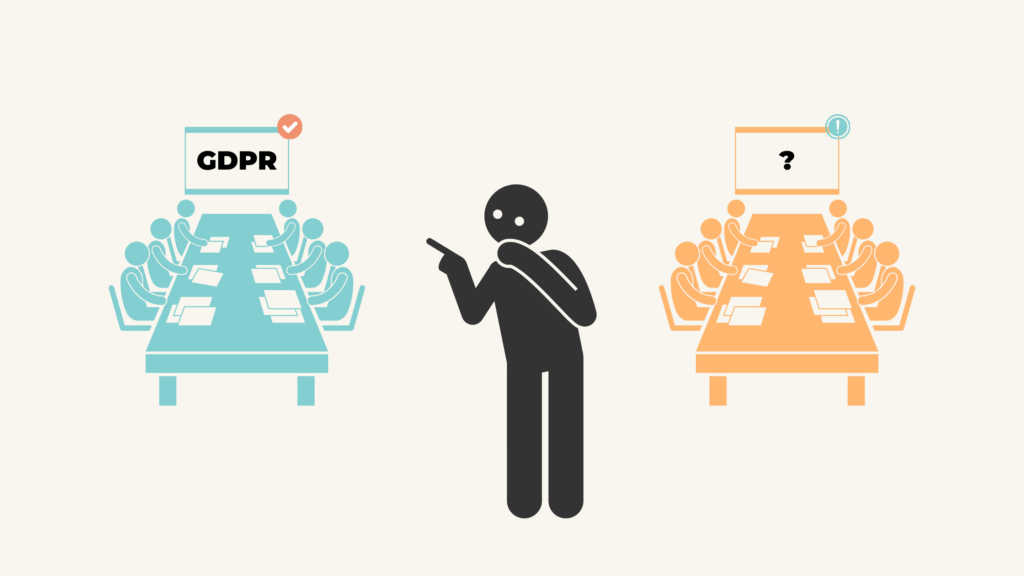This approach positions GDPR not just as a regulatory requirement but as a strategic asset.
Start by asking management for the company’s Records of Processing Activities. Think of this as a detailed diary that lists how the company uses personal data, from customer emails to employee records.
This sounds technical, but it’s not.
Importantly, if you can’t access the company’s Records of Processing Activities, it’s a clear sign that the company is not GDPR compliant, and as a board member, it falls upon you to ensure that efforts to comply are initiated.
Moreover, lack of compliance also signals a heightened risk of data breaches, representing a significant business risk, which calls for your proactive data breach risk management.
GDPR at Board Meetings
You would demonstrate diligence by ensuring the company has Records of Processing Activities, and the level of details or lack thereof it provides you with is a great indicator of the state of GDPR compliance within the company.
The following will be indicators that should cause concern to board members on the state of GDPR compliance within the company:
- No easily accessible Records of Processing Activities.
- Disinterest in GDPR from management.
No Records of Processing Activities
A company cannot be GDPR compliant without a detailed Record of Processing Activities, and it is unlikely to be GDPR compliant without one.
A detailed Record of Processing Activities is necessary to ensure proper implementation of all other requirements of the GDPR, so the lack thereof is a strong signal to the board members that GDPR compliance is lacking in the company.
Disinterest in GDPR from Management
GDPR compliance demands significant effort from a company, impacting every business process involving personal data.
Board members should be concerned by management’s lack of interest, as it indicates both a misunderstanding of compliance requirements and a deficiency in security culture.
This indifference risks business operations, reputation, and stakeholders whose data is being processed.
How to Initiate Positive Change
When the obvious importance of complying with the legal requirements of the GDPR has been established, then board members should encourage the company in the following steps to get started in GDPR compliance:
- Ensure the company appoints a dedicated employee to lead GDPR efforts.
- This person should be provided with the resources and authority to act.
- Seek training and/or external advice for a smooth process.
- Start with a thorough GDPR audit, and create the Records of Processing Activities.
- Strongly consider using specialised software for GDPR compliance.
In the following, we will examine how these 5 steps can initiate positive change.
Assigning Responsibilities
Aligning an organisation’s processes and systems to a regulatory framework like the GDPR requires a dedicated employee. It does not require a full-time position, but someone operational must be responsible for this task.
This person should report to a leadership role within the organisation so that matters affecting the entire organisation can be considered at the highest organisational level when necessary.
Resource Allocation
It is essential to allocate sufficient resources to the person taking on the task of GDPR compliance. If the organisation wants change, it must be willing to fund it, and it should preferably do so by allocating both time and financial resources.
Seek Advice and Training
To speed up the process and avoid wasting anyone’s valuable time, you should ensure that the new GDPR compliance manager is offered training on the topic. The organisation will benefit greatly because everyone will see that their daily work is affected by GDPR compliance.
Remember, the GDPR affects all processes and systems within the organisation, so the quality of the GDPR compliance manager’s knowledge will have ripple effects across the organisation.
Basic awareness training in the GDPR, privacy, and IT security will be beneficial to ensure that everyone in the organisation can communicate effectively on the topic. This will furthermore strengthen the internal security culture, thereby reducing the risk of data breaches.
Conduct a GDPR Audit
The first task after establishing the role of the GDPR compliance manager is to establish a baseline for the organisation’s GDPR compliance. This will be done by conducting an audit, which should be part of creating the Records of Processing Activities.
Implement GDPR Compliance Software
Your company would very likely benefit from using a designated GDPR compliance software.
Using GDPR software to construct your GDPR compliance documentation, tasks, and continuous tasks can help the company reach compliance faster and with fewer issues.
Many organizations overlook the benefits of GDPR compliance software, focusing instead on the cost of an additional subscription. They often fail to weigh this expense against the significant time savings and improved quality it offers. Adopting GDPR compliance software is highly recommended for companies aiming for GDPR compliance, regardless of their size.
Continuous Improvement
GDPR compliance is an ongoing process that requires continuous monitoring, evaluation, and improvement.
As a board member, you should request regular updates at board meetings to stay informed about the status of this ongoing task and identify ways to support the organisation’s compliance efforts. Additionally, difficulties in achieving GDPR compliance may signal to you, as a board member, that there are broader issues with organisational control and management.
The Role of the Board Member in GDPR
GDPR compliance is typically stuck in management’s lack of interest and resource allocation and support for the people tasked with bringing GDPR compliance in order.
Therefore, this is also where board members can make a difference by telling management to prioritise GDPR compliance and allocate resources. If not, the business and its stakeholders will be put at risk.
GDPR compliance often stalls due to management’s disinterest, insufficient resource allocation and lack of support for those responsible for implementing compliance measures.
This is precisely where board members can effect change by urging management to prioritise GDPR compliance and allocate necessary resources. Failure to do so risks compromising the business and its stakeholders.

